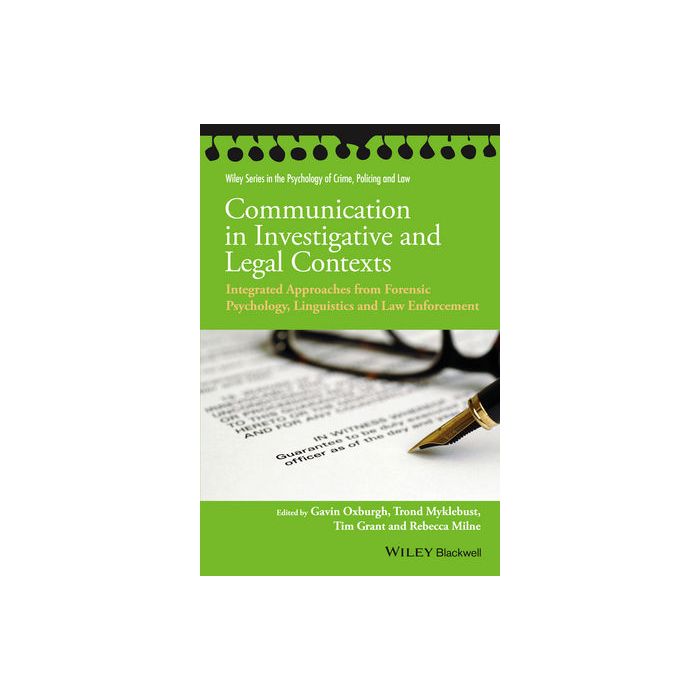Communication in Investigative and Legal Contexts: Integrated Approaches from Forensic Psychology, Linguistics and Law Enforcement HARDBACK [Oxburgh - Wiley - Blackwell]

- ISBN/EAN
- 9781118769232
- Editore
- Wiley - Blackwell
- Formato
- Cartonato
- Anno
- 2015
- Pagine
- 408
Disponibile
108,00 €
Communication in Forensic Contexts provides in-depth coverage of the complex area of communication in forensic situations. Drawing on expertise from forensic psychology, linguistics and law enforcement worldwide, the text bridges the gap between these fields in a definitive guide to best practice.
Offers best practice for understanding and improving communication in forensic contexts, including interviewing of victims, witnesses and suspects, discourse in courtrooms, and discourse via interpreters
Bridges the knowledge gaps between forensic psychology, forensic linguistics and law enforcement, with chapters written by teams bringing together expertise from each field
Published in collaboration with the International Investigative Interviewing Research Group, dedicated to furthering evidence-based practice and practice-based research amongst researchers and practitioners
International, cross-disciplinary team includes contributors from North America, Europe and Asia Pacific, and from psychology, linguistics and forensic practice
Maggiori Informazioni
| Autore | Oxburgh Gavin; Myklebust Trond; Grant Tim; Milne Rebecca |
|---|---|
| Editore | Wiley - Blackwell |
| Anno | 2015 |
| Tipologia | Libro |
| Lingua | Inglese |
| Indice | 1 Communication in Investigative and Legal Settings: Introduction and Contexts 1 Gavin Oxburgh, Trond Myklebust, Tim Grant and Rebecca Milne SECTION I: Communication, Language and Memory 15 2 Exploring Types and Functions of Questions in Police Interviews 17 Tim Grant, Jennifer Taylor, Gavin Oxburgh and Trond Myklebust 3 Recall, Verbatim Memory and Remembered Narratives 39 James Ost, Alan Scoboria, Tim Grant and Gary Pankhurst SECTION II: Communicating with Victims and Witnesses 55 4 Interviewing Child Witnesses 57 David La Rooy, Georgina Heydon, Julia Korkman and Trond Myklebust 5 Interviewing Adult Witnesses and Victims 79 Coral J. Dando, R. Edward Geiselman, Nicci MacLeod and Andy Griffiths 6 The Role of Initial Witness Accounts within the Investigative Process 107 Fiona Gabbert, Lorraine Hope, Elisabeth Carter, Roel Boon and Ronald Fisher SECTION III: Communicating with Suspects 133 7 Interviewing Suspected Offenders 135 Gavin Oxburgh, Ivar Fahsing, Kate Haworth and J. Pete Blair 8 A (Nearly) 360° Perspective of the Interrogation Process: Communicating with High ]Value Targets 159 Fadia M. Narchet, Melissa B. Russano, Steven M. Kleinman and Christian A. Meissner SECTION IV: Communicating in the Courtroom 179 9 Courtroom Questioning and Discourse 181 Emily Henderson, Christopher Heffer and Mark Kebbell 10 Expert Witness Communication 209 Lorna Fadden and Lawrence M. Solan SECTION v: Specific Communicative Tasks 229 11 Hostage and Crisis Negotiation, Perspectives on an Interactive Process 231 Ole Andre Braten, Michel St ]Yves, Terry D. Royce and Marty Laforest 12 Verbal Lie Detection 259 Aldert Vrij, Paul Taylor and Isabel Picornell 13 Vulnerable Individuals, Intermediaries and Justice 287 Brendan M. O’Mahony, Ruth Marchant and Lorna Fadden 14 The Interpreter ]Mediated Police Interview 315 Yvonne Fowler, Martin Vaughan and Jacqueline Wheatcroft SECTION vi: Conclusions and Future 335 15 Improving Communicative Practice: Beyond the Cognitive Interview for Adult Eyewitnesses 337 Nina J. Westera and Martine Powell 16 Communication in Forensic Contexts: Future Directions and Conclusions 359 Trond Myklebust, Gavin Oxburgh, Tim Grant and Rebecca Milne Index 367 |
Questo libro è anche in:
